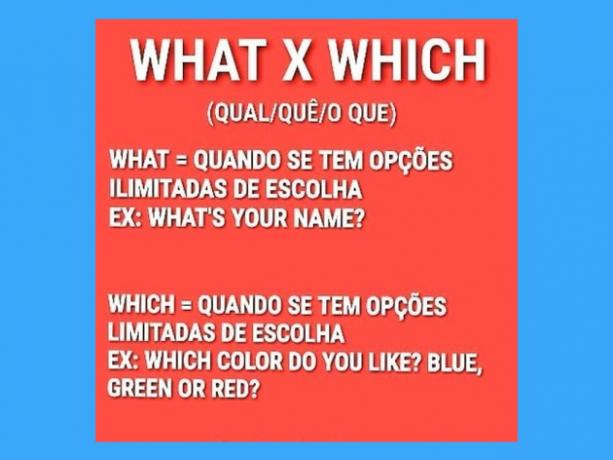You modal verbs (modal verbs) are auxiliary verbs that have a direct impact on the sense of the main verb they precede.
They are often used to indicate possibility, doubt, suggestion, permission and obligation, among others.
One of the specifics of the use of modal verbs is that they are always accompanied by an infinitive verb without the I'm.
The most used modal verbs in English are: can, could, will, would, should and may.

Check out the explanations below and learn more about some of the main modal verbs from English.
Can
Can is used in the sense of power and/or get, and can indicate capacity/abiliity, order, permission and possibility.
Can’t and cannot are the negative forms of can.
Examples:
- they can speak japanese. (They can speak Japanese.)
- Can I leave the room? (Can I leave the room?)
- she can use my computer. (She can use my computer.)
- he can’t go to the party. (He couldn't go to the party.)
- We cannot arrive late. (We cannot be late.)
could
the modal verb could is the past form of the verb can.
could means could, could and/or it could and is used to indicate capacity/abiliity, order, permission and possibility.
Couldn't and could not are the negative forms of could.
Examples:
- they could speak japanese. (They could speak Japanese.)
- Could I leave the room? (Could I leave the room?)
- she could use my computer. (She could use my computer.)
- He couldn’t go to the party. (He couldn't go to the party.)
- We couldn’t arrive late. (We couldn't be late.)
will
will is a modal verb that does not have a meaning of its own, but is used to indicate that the action expressed by the verb that follows it refers to the future.
wont and will not are the negative forms of will.
Examples:
- they will study Japanese. (They will study Japanese.)
- Will you leave the room? (Will you leave the room?)
- She will use my computer. (She will use my computer.)
- He won’t go to the party. (He won't go to the party.)
- We won’t arrive late. (We won't be late.)
would
the modal verb would is the past form of the verb will.
would it is a modal verb that does not have a meaning of its own, but alters the sense of the verb that precedes it.
would is used for indicate possibility, ask something politely, offer something and reference a hypothetical situation.
Would not and would not are the negative forms of would.
Examples:
- They would study Japanese if they had the money. (They would study Japanese if they had the money.)
- Would you leave the room earlier if he asked you to? (Would you leave the room early if he asked you?)
- She would use my computer if hers was broken. (She would use my computer if hers was broken.)
- He woudn’t go to the party by himself. (He wouldn't go to the party alone.)
- We wouldn’t arrive late in such a special day. (We wouldn't be late on such a special day.)
Should
the modal verb should could mean he must and/or should.
Should has the function of auxiliary verb and is used to express advice, suggestion, expectation, probability and to owe.
Shouldn't and should not are the negative forms of should.
Examples:
- He should not arrive late at his brother's wedding. (He shouldn't be late for his brother's wedding.)
- We should arrive early at the train station. (We must arrive early at the train station.)
- She shouldn't talk on the phone while driving. (She shouldn't talk on the phone while she drives.)
- They should arrive in 10 minutes. (They should arrive in 10 minutes.)
- you should fasten your seatbealts. (You must put on your seat belt.)
May
May is a modal verb that can be translated as he can and/or it could and indicates order, possibility and permission.
may not is the negative form of may.
Examples:
- May I drink some water? (Can I drink some water?)
- she may leave now. (She can leave now.)
- he may be really tired. (He must be very tired.)
- They may not like the gift. (They might not like the gift.)
- it may rain. (It can rain.)
Video
Check out the video below and understand the difference between the uses of can and may.
Exercises
1. (FIEB-SP/2016) In the fragment from the second paragraph – These connections may allow access to the Internet, for example to show computers in a store…” – the word in bold indicates
a) need.
b) advisability.
c) request.
d) possibility.
e) permission.
Correct alternative: d) possibility.
The word may gives a sense of possibility to the preceding verb: allow (to allow).
Therefore, the phrase indicates that the connections they can allow access to the Internet.
2. (Unesp/2014) Examine the panel to answer the question.

In the context of the comic, the term "can" indicates an idea of
a) skill
b) knowledge
c) request
d) obligation
It's certain
Correct alternative: c) order
In the sentence, the boy asks to read tweets instead of reading a book. Therefore, using can indicates a order.
3. (UFABC/2007) In The fact that a person should consume eight glasses of water per day, the relation of meaning expressed by should it's from:
the prohibition
b) probability
c) assumption
d) capacity
e) counseling
Correct alternative: e) counseling
The quoted phrase indicates advice, a recommendation regarding the amount of water a person should drink per day.

